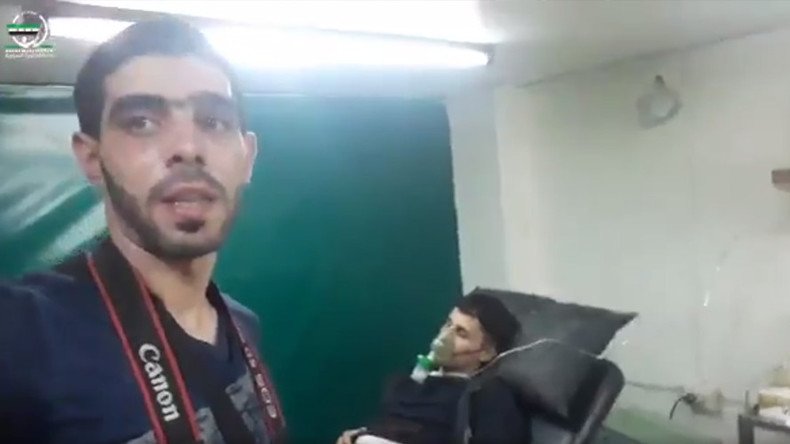'US claim that Assad preparing chemical attack is inventing excuse to go against Syrian Army’

By saying that the Assad government is preparing a chemical attack, the US might be looking for a pretext to escalate against the Syrian army, analysts told RT, adding that while there have been allegations, no credible proof has emerged.
Maria Zakharova, the Russian Foreign Ministry's spokeswoman, on Sunday slammed videos that claimed to show the aftermath of a chemical attack in Syria, saying they are fakes produced as part of an anti-Assad propaganda campaign.
Videos purporting to show victims of an Assad-ordered chemical attack flooded social media on Saturday. That followed White House accusations aimed at the Syrian government of preparing a toxic strike.
Yet, when Washington was asked to back up its allegations that Damascus was preparing a chemical attack, it failed to provide any evidence.
Alaa Ibrahim, a Syrian journalist, citing the Syrian army statement, said that Damascus denied “any use of chemical weapons, saying that this is a well-known tactic used by the armed terrorist groups.”
“When these groups feel they are on the fallback, they try to stage chemical attacks to stop the army from advancing. I’m quoting the Syrian military official statement,” he said.
“When we’re discussing any scenarios about possible chemical weapons attacks, we have to bear in mind that this is a criminal act and crimes should be investigated thoroughly, [we should] not just count on circumstantial evidence. This is what happened in previous incidents – whether it was the alleged chemical weapons attack in Khan Shaykhun in April earlier this year, or the recent incident. It is always the same: there have been allegations, intelligence, but we have no credible proof or evidence of what really happened,” he told RT.
Middle East expert Ali Rizk noted that American claims about the Syrian government allegedly preparing a chemical attack “have been refuted by many sources.”
“If you recall recently, the famous investigative journalist Seymour Hersh said that the previous incident whereby the Syrian army was accused of using chemical weapons in Khan Shaykhun turned out to be false and that there was a false American pretext when they launched an attack on the Shayrat airbase. Basically, what we’re witnessing maybe is America inventing certain excuses or pretexts to escalate against the Syrian army,” he said.
“I think it is important to note that America’s two closest allies in the region – Israel and Saudi Arabia – these two players are very much against Syria emerging victorious in this war; not just Syria – Iran, Hezbollah, Iraq. They don’t want this axis… to be strengthened, as a result of the Syrian war. So, for that reason I think that you’re seeing Israel, Saudi Arabia pushing or dragging the Trump administration into such policies and such escalation. Of course, we cannot detach American policy from Israeli and Saudi policy. I think in the end America’s policy in the region is the same as Israel’s, and especially as Saudi Arabia’s. We remember that Trump’s first foreign visit as president was to Saudi Arabia and directly after that also to Israel.”
Campaign to falsely blame Assad govt for ‘use of chemical weapons’ has begun – Russian FM spokeswoman https://t.co/4biUNROQabpic.twitter.com/TDmb8MMw9R
— RT (@RT_com) July 2, 2017
RT asked Jan Oberg, director of Transnational Foundation for Peace and Future Research, whether US threats of an intervention are influencing the situation in the region.
Jan Oberg: If an event is taken serious as truthful, politicians will have to react to it, because there is a close symbiosis now between the mainstream media and political power. Very few critical questions are raised. We’ve seen again and again that it was possible to legitimate warfare, because something was building up, a media drive was made that made it look like the warfare or intervention – such as [against] Saddam's weapons of mass destruction – would be the only reasonable thing to do. Now afterward, who is taking responsibility for this? Let me say, it is very important that we’re aware that knowledge, good analysis, etc. is all put in the background these days in international politics. I am old enough to remember politics based on intellectual reasoning knowledge and analysis. What we’re into here is totally wobbly ground from even, if you see it at the moment, the State Department, and the US is being emptied of people who know things, intellectuals, in terms of scholarly input into the political decision-making process is disappearing.
RT: The media are questioning the lack of evidence provided by the US. Why is it failing to, or refusing to, disclose any evidence?
JO: The mainstream media, the large media that are influencing the western decision-making process and the citizens opinions’ about this. You take the case for instance of the totally bleak picture that is painted of Bashar al-Assad – nobody can be as evil as he has been made in the western world... It is obvious that what journalists keep on doing, the media keep on doing is the wrong thing. They look at the violence being used. They don’t look and still don’t know how to do conflict journalism. Media love warfare somehow, but they don’t love the conflicts, and they don’t understand conflicts in such a way that they can help the citizens understand what is Syria about.
The statements, views and opinions expressed in this column are solely those of the author and do not necessarily represent those of RT.












